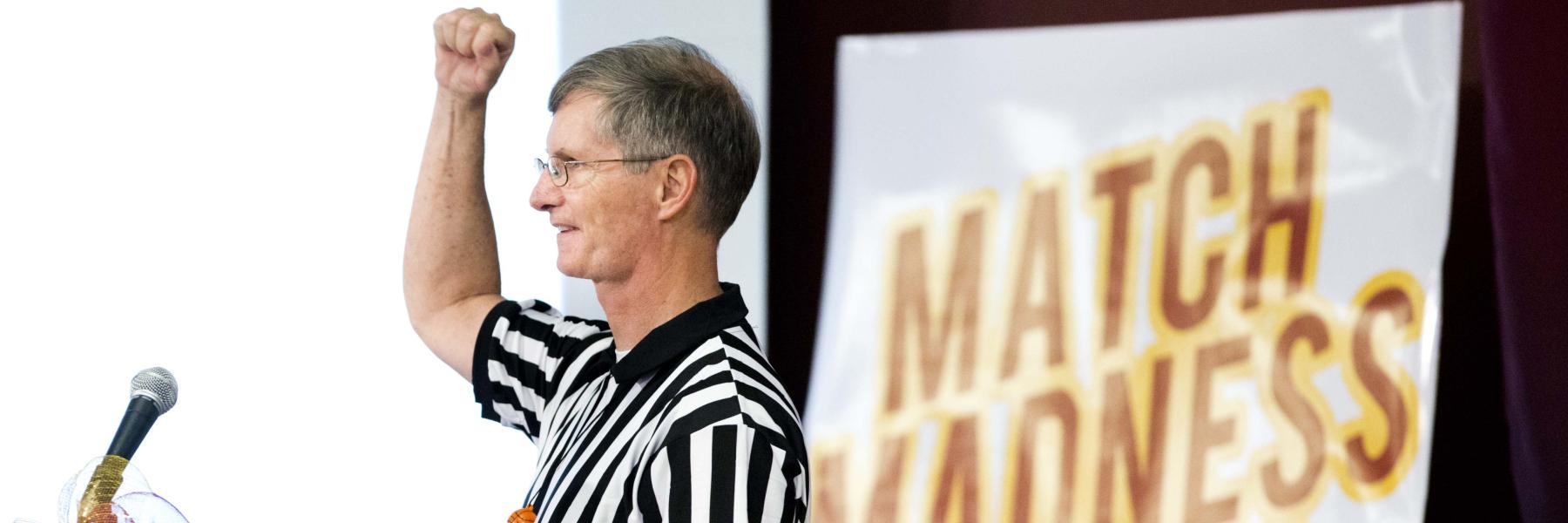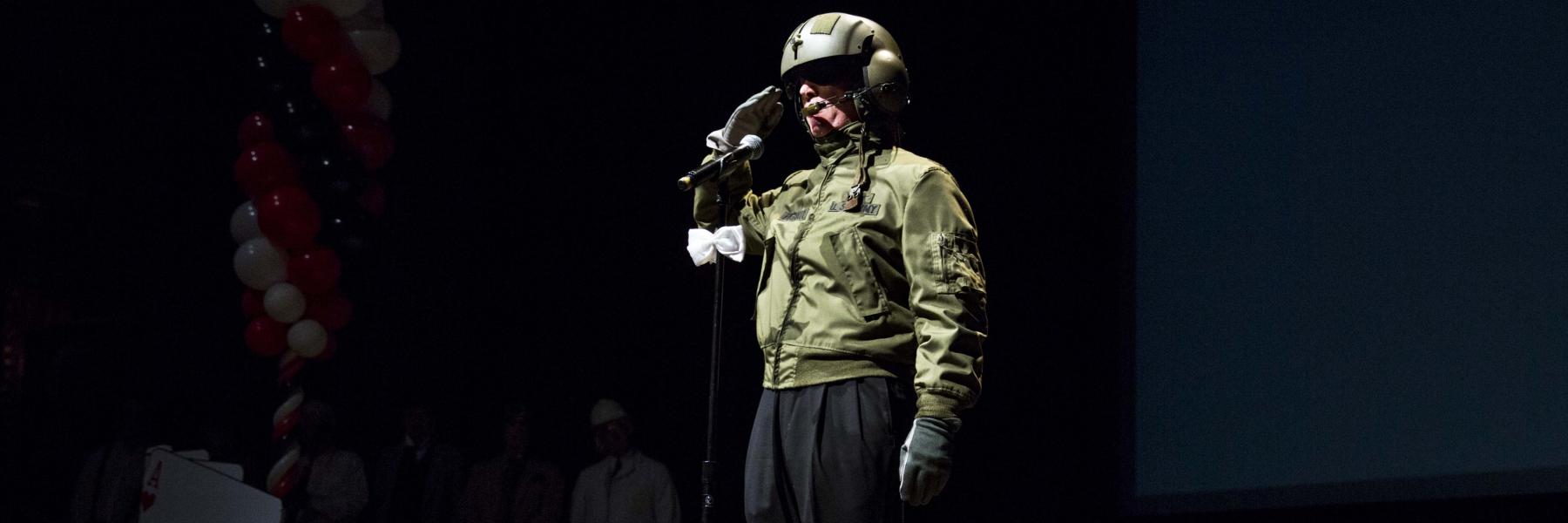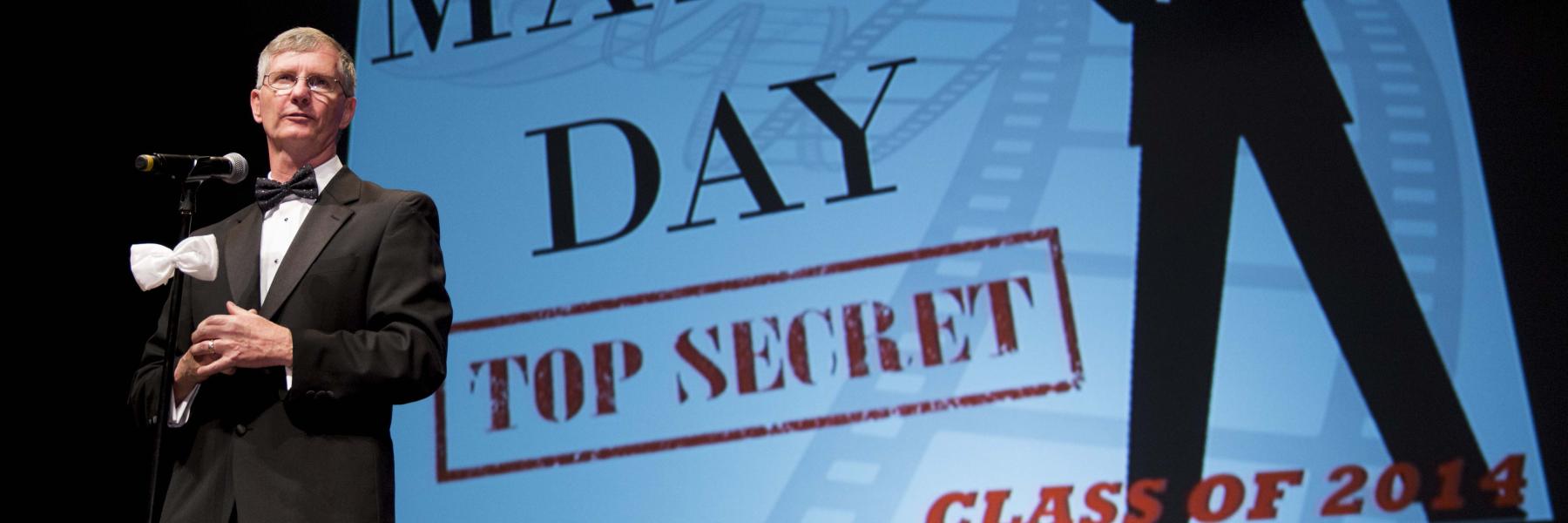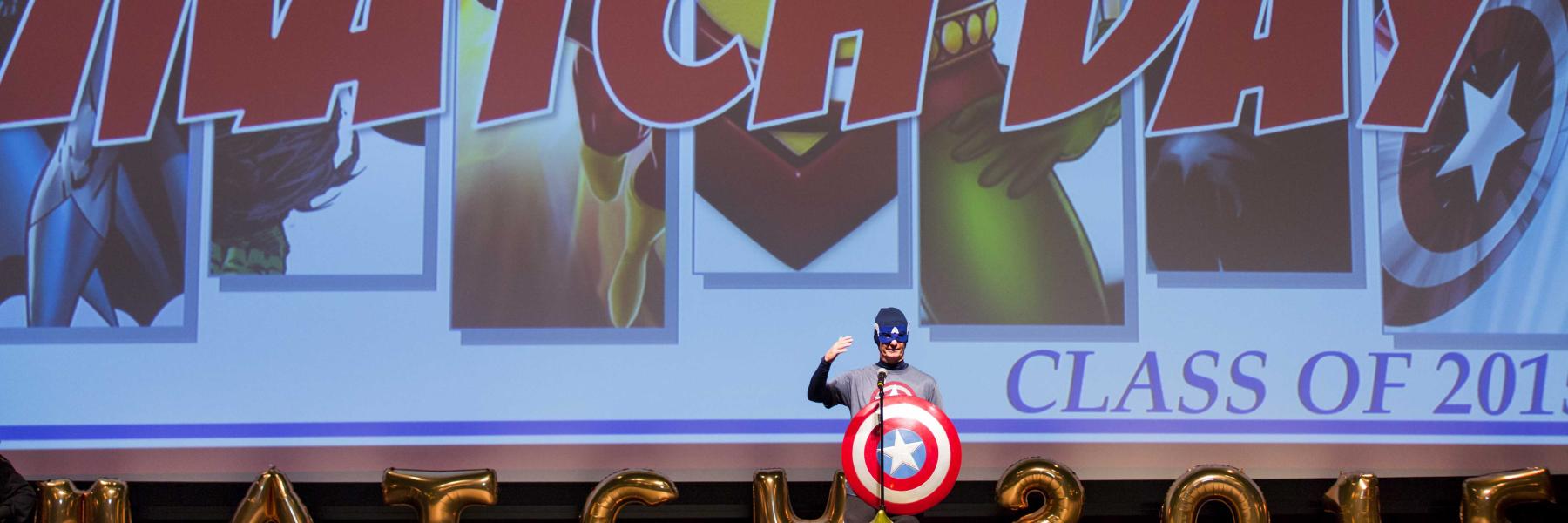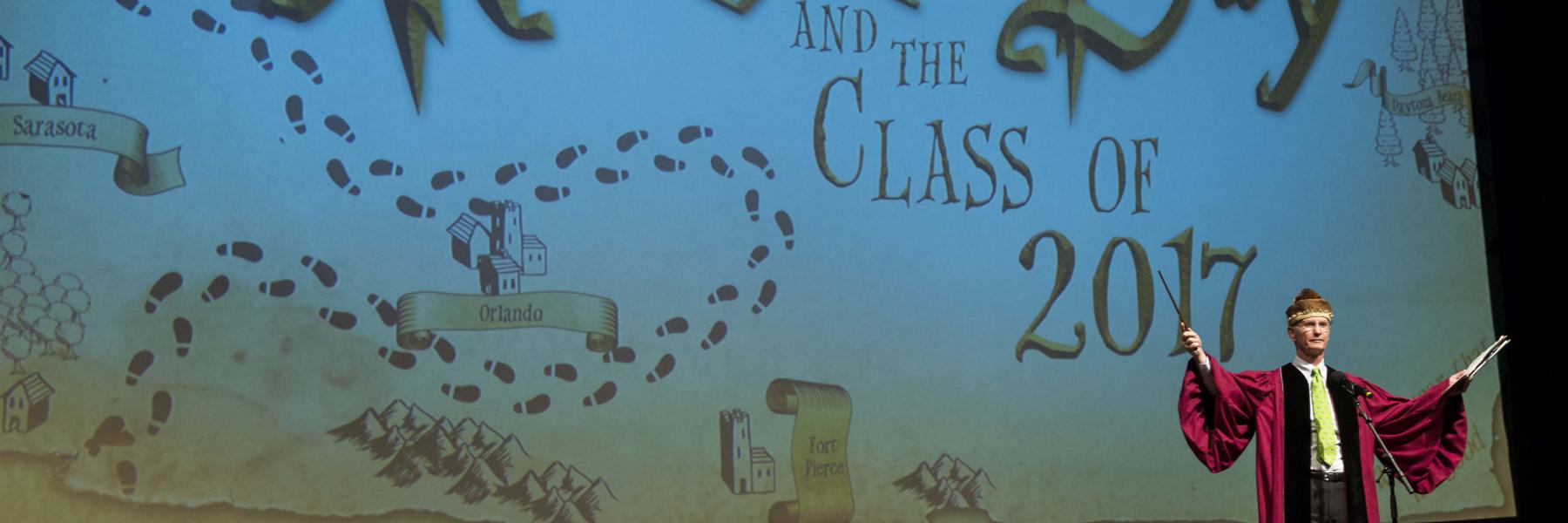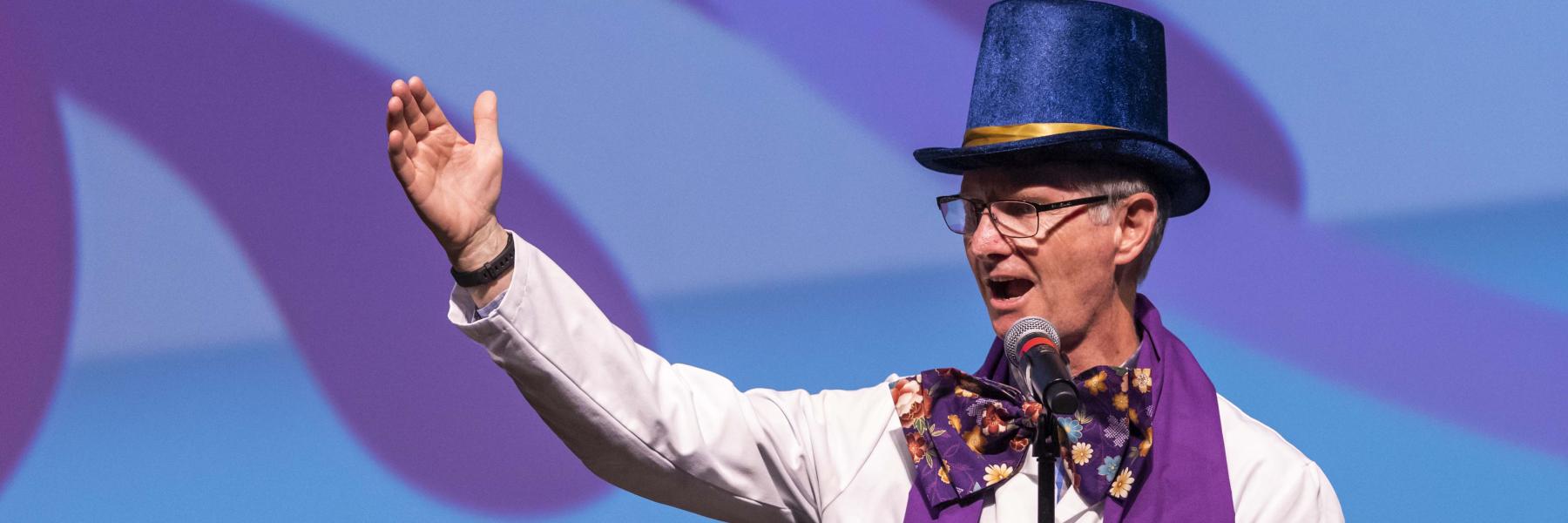Travels with J: Fogarty and the College of Medicine have come a long way
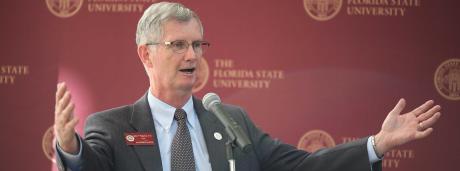
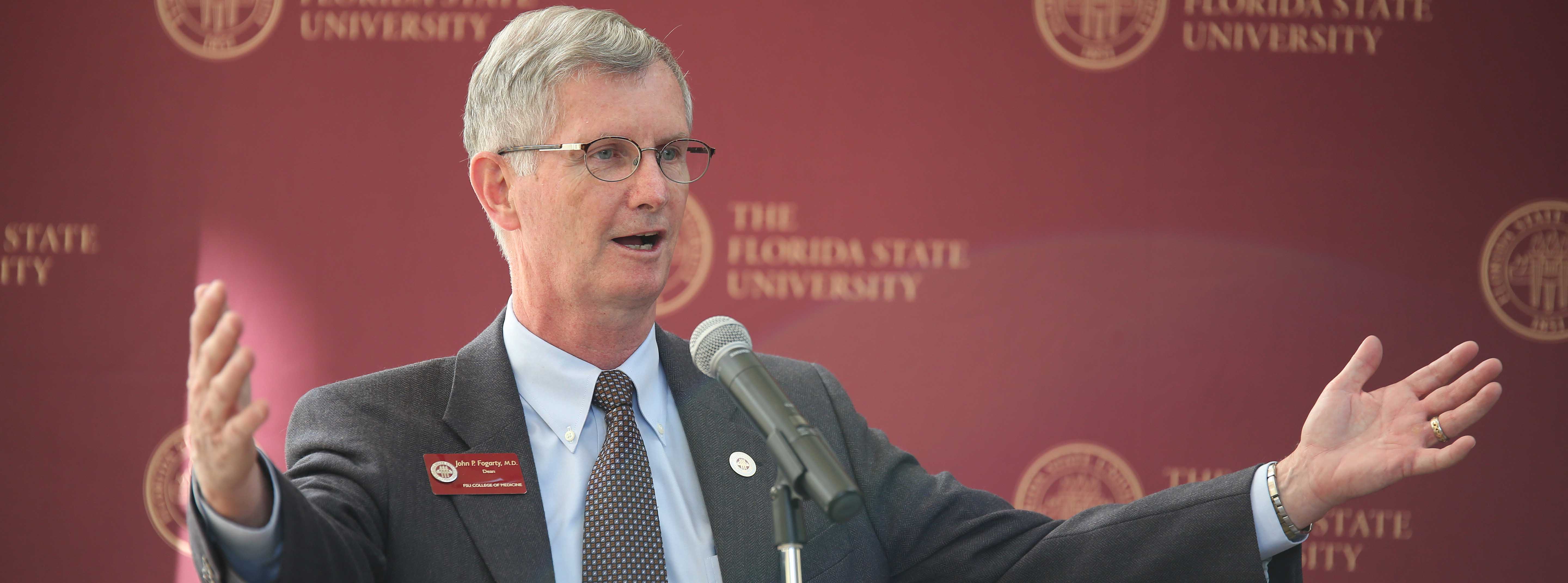
Dec. 14, 2021
TALLAHASSEE – Dr. John P. Fogarty, who has served as dean of the Florida State University College of Medicine for nearly 14 of its 21 years, has announced his plans to retire from the position in 2022.
During his time, he became one of the longest-serving medical school deans in the country, with about 95% of the 155 programs in the U.S. changing deans at least once during his tenure. But then, about 38 of those schools opened AFTER he became dean at FSU (and in many ways because of FSU leading the way in convincing the Association of American Medical Colleges and American Medical Association that more medical schools were needed in this country).
Fogarty’s tenure has covered a lot of ground. Literally.
He has driven over 45,000 miles to visit the school’s six regional campuses (from Fort Pierce to Pensacola) and residency programs. For example, he’s made an estimated 30 trips to the Pensacola Regional Campus – at 400 miles a pop (round-trip).
Along the way, he’s given about 250 speeches, but that includes only ceremonial events such as graduation, Match Day and the White Coat Ceremony, to name a few, and excludes dozens of impromptu speeches he’s also given at special events or when showing important visitors around the med school or speaking to aspiring medical students on interview day.
A search firm will lead the effort to find Fogarty’s replacement, who could be in place by the late spring or summer. The successor will find a far different medical school than the one Fogarty took over upon arrival from his former job as senior associate dean for operations and associate dean for primary care at the University of Vermont College of Medicine.
Since Fogarty arrived, the college has:
- Grown from around 3,000 applicants a year to more than 7,000 annually for M.D. admissions (the numbers peaked above 8,000 during the COVID pandemic).
- Expanded the number of community physicians who are part of the clerkship faculty from around 1,500 to nearly 2,800 and more than doubled the size of College of Medicine staff.
- Grown research grants and contract funding from around $20 million to more than $140 million.
- Created nine residency programs, including two in family medicine, three in internal medicine and one each in general surgery, emergency medicine and dermatology. A new psychiatry program was announced recently and others are being discussed.
- Opened a School of Physician Assistant Practice, which graduated its third class on Dec. 11.
- Developed the new health-care focused Interdisciplinary Medical Sciences undergraduate degree program at Florida State in connection with six other FSU colleges. The program is based at the medical school and has quickly become the second-most popular major at FSU.
- Successfully completed two M.D. accreditation cycles with the Liaison Committee on Medical Education.
- Developed the Florida Medical Practice Plan and clinical practices FSU SeniorHealth, FSU PrimaryHealth and FSU BehavioralHealth. FSU PrimaryHealth is located in a new 10,000 square-foot building in southwest Tallahassee, dedicated to an underserved community there.
- Expanded the central campus to include fourth-floor office space that houses two of the college’s five academic departments (Geriatrics and Behavioral Sciences and Social Medicine) along with student study space and an exercise room.
- Moved four regional campuses into new buildings (Orlando, Sarasota, Pensacola and Tallahassee) during his tenure.
- Committed to developing a health care “campus” with clinical practice, research and teaching opportunities in Panama City Beach in partnership with the St. Joe Company and Tallahassee Memorial HealthCare.
- Signed off on having Tallahassee Memorial HealthCare become an Academic Medical Center with FSU as its academic and research partner.
Fogarty turned 72 in September, but thanks to regular physical activity (and genetics) doesn’t look far removed from the young man who graduated from the U.S. Military Academy at West Point in 1971.
“His energy level is impressive in the way he meets the demands of a not-surprisingly busy schedule. He’s usually the first one downstairs at breakfast and I don’t ever recall a time when he missed one of those trips for any reason other than a schedule conflict,” said Dr. Alma Littles, senior associate dean for medical education and academic affairs, and the person who most often accompanies Fogarty on those campus visits.
“Dean Fogarty was the perfect choice to lead our College of Medicine from its adolescence to the mature program we have today,” said Paul McLeod, dean of the Pensacola Regional Campus, which took its first students five years before Fogarty’s arrival.
“One of his strongest leadership qualities is his personal interest and involvement with the students,” McLeod said. “No other medical school dean in the country makes regular ‘listening’ visits to the student learning communities, dresses the part of Willie Wonka, Dumbledore or Obi-Wan Kenobi for our Match Day events and then travels all over the state to participate in student events, like our regional campus graduation ceremonies.”
In fact, Fogarty lists Willie Wonka as his favorite among the characters he has played (so far) on Match Day. Well, Wonka and James Bond. It’s a tie.
He (Fogarty, not Willie Wonka) regularly attends student events (in addition to the 13 M.D. commencement ceremonies he has presided over), often eats lunch with students in their learning communities to hear what’s on their minds and makes regular appearances in the Clinical Learning Center. Once, he allowed students (and others) to smash whipped cream pie in his face for a fundraiser, and during the annual alumni tailgate he’s usually flipping burgers on the grill.
Fogarty also is a heavily involved member of Killearn United Methodist Church, where he takes part in mission trips to Nicaragua and frequently plays roles in the church’s annual, outdoor “living Christmas” performance that has been seen by thousands of visitors over the years. “But only one speaking part,” Fogarty said. “I had to tell Joseph there was no room at the inn.”
For the past two years, he has served as a station leader at monthly “Sleep in Heavenly Peace” bunkbed builds and delivered them to needy families in Tallahassee and throughout the Panhandle.
Fogarty became dean in August of 2008, replacing Dr. J. Ocie Harris, who had led the college since 2003. Dr. Joe Scherger was the school’s first dean, serving from 2001 until January of ’03. Myra Hurt, now Professor Emerita, served as the school’s acting dean from 2000 until Scherger’s arrival.
Fogarty has worked with five different FSU presidents and three provosts (soon, a fourth). Oh, and he’s outlasted three FSU football coaches. He’s a season ticketholder for basketball, and regularly attends FSU baseball games.
Fogarty developed a reputation as an optimistic and humble leader who was accessible to all. One of his favorite days of the year is when new students visit his office as part of their orientation checklist. True to his military roots, he asks them to sing a patriotic song to receive a puzzle piece for their checklist.
The purpose of the visits is so students know where his office is and aren’t afraid to go see him later if there’s something they want to talk about.
“I think many students became comfortable to come by and ask for support for their various causes or proposals,” Fogarty said. “Some of the best ideas were generated by student requests, including Racism Awareness Week, Special Grand Rounds, and Leadership in Medicine.”
GME BECAME A PRIORITY
“Dean Fogarty has been a phenomenal leader throughout his tenure at the College of Medicine. His vision has led to the growth and development of many student initiatives, but also significant expansion of our residency programs to help meet the physician manpower needs for Florida, especially in primary care disciplines,” said Dr. Joan Younger Meek, associate dean for GME and dean of the Orlando Regional Campus. “Since Dean Fogarty took over the helm of the College of Medicine, we have added nine new residency programs and three fellowship programs, training almost 150 residents and fellows per year in partnership with hospitals throughout the state.
“I personally appreciate the leadership opportunities that I have been afforded at the College of Medicine under Dean Fogarty’s command and respect his ability to provide guidance, while also allowing sufficient autonomy for his faculty and leadership. The FSU College of Medicine and medical communities throughout the state will benefit from Dr. Fogarty’s achievements for many years.”
Fogarty, who considers the expansion of GME to be among his proudest achievements, said he developed his leadership style during a 24-year career as an Army physician and academician, where he rose to the rank of colonel and served as chair of family medicine at the Uniformed Services School of Health Sciences prior to retirement in 1995.
He came to the FSU College of Medicine after 11 years at the University of Vermont, drawn not only by the warm weather, but by a mission he understood and believed in.
“It took me a while to figure out why I liked this job so much, and I realized after a few years that it was because I was back in an organization that had a true mission,” Fogarty said for a leadership profile the university wrote about him in 2018. “Our mission is to produce the doctors that Florida really needs. Having spent so much time in the military, having a mission really made a difference for me.”
Fogarty also sought ways to extend his leadership beyond the medical school.
He volunteered his time with the Liaison Committee on Medical Education for six years through 2017 and served as LCME chair, 2015-16. To some, that was ironic considering the FSU College of Medicine in its infancy had fought a difficult battle against the LCME to prove that this country really did need more medical schools. The LCME went from telling FSU the U.S. had a glut of physicians to calling for a 30% increase in medical school enrollment in 2006. Fogarty served as site visit chair on multiple LCME visits that approved a number of those new medical schools.
He has also served as chair of the Council of Florida Medical School Deans since 2010, a collaborative effort of the state’s medical school deans to communicate and amplify effectiveness of the schools’ considerable impact on health care in Florida.
“When I arrived at USF in 2014, Dean Fogarty was the first Florida medical school dean to welcome me. He has been a trusted advisor ever since,” said Dr. Charly Lockwood, dean of the Morsani College of Medicine at USF and senior vice-president of USF Health. “He has been a visionary leader for the FSU College of Medicine. I can attest that his leadership of the Council of Florida Medical School Deans has been equally transformative, making it a crucial voice for public health and a vital asset for state leaders.”
Lockwood invited Fogarty to be the featured speaker when USF Health opened its new medical school location and heart institute in downtown Tampa.
“He explained to the assembled donors, stakeholders and legislators just how important medical schools are for the health and economic vitality of the state,” Lockwood said. “Dean Fogarty has become a true friend and will be greatly missed by his decanal colleagues.”
While Fogarty enjoyed playing Match Day characters and conversing with students, the role of dean wasn’t always fun.
“Sometimes I had to welcome them to the ‘principal’s office,’” he said. “I hoped they never would need to come back for something negative, and it was great if I could find a way to give them a second chance, but sometimes it would be what they did not want to hear.”
A low point occurred in 2017, when second-year medical student Matt Wittman committed suicide, dealing a blow to the entire community.
“I truly never thought it could happen here. We had only ‘happy medical students,’” Fogarty said. “It was a wake-up call.”
In response, Fogarty took steps leading to the development of the Wellness Committee to constantly assess the medical school environment and culture for students, staff and faculty, and wellness was added as a central focus of orientation activities for new students. Fogarty also has invited Wittman’s parents back to speak with current students on several occasions.
One of the wellness activities included in orientation is mandatory visits to the College of Medicine’s counseling center and counselors to remove the stigma of such visits and encourage using those services in a proactive way.
“We also ask students to look out for each other and encourage them to seek help if they are struggling in any way,” Fogarty said.
In 2020, already besieged by a pandemic that would force the cancelation of live events from Match Day to the White Coat Ceremony and commencement, came the aftermath of George Floyd’s death at the hands of a Minneapolis police officer.
Floyd’s death led to worldwide protests and stirred an emotional response among students and faculty alike. Fogarty joined them for a march from the medical school to the state Capitol and called for a student-led town hall meeting to hash out feelings and discuss issues related to race and health equity.
Not long before announcing his planned retirement as dean, Fogarty attended an informal 50th anniversary reunion with many of his classmates from the U.S. Military Academy at West Point. The formal reunion was canceled because of COVID, so Fogarty and his classmates attended an Army-Air Force football game in Dallas.
He often watched the Army-Navy game in town with other West Point graduates and wasn’t afraid to lead the group in cheers.
He met Diane, his wife of 47 years, when he was a first-year med student and she was a first-year nursing student. They met in the Albany (N.Y.) Medical Center cafeteria and were married at West Point at the end of his third year when she was completing her nursing training.
They have three children (John, Patty and Becky) and seven grandchildren (Landon, Brennen, Jacob, Ethan, Virginia, Eleanor and Katherine). Traveling to visit the kids and grandkids in Jacksonville, Apex, N.C., and Aurora, Colo. has always been a priority.
As for his successor, Fogarty said there will be plenty of challenges for the next era of growth, including:
- Developing a balanced mix of young, recently trained faculty with older, seasoned faculty and more mid-career faculty.
- Identifying resources to pay for the next generation of clinical and research faculty at a time when the College of Medicine budget has been flat, has not developed substantive clinical revenue and has not had any tuition increases in eight years (the college’s tuition is the lowest in Florida and in the bottom quintile nationally).
- Finding new research space for new faculty.
“I’m confident that after 20 years of history, our distributed, community-based model in physician offices, and our successful pipeline programs, that we can and will sustain the mission,” Fogarty said. “Quality primary care is still desperately needed in our overspecialized health care system.”
“We also can expand our research portfolio as we have with successful research hires and investments. Our school is uniquely positioned to focus research on our mission priorities in rural and minority communities and we’ve made great progress with spectacular grant success in the last few years with these initiatives, particularly in behavioral health areas.”
While he will miss those road trips to regional campuses with Littles and retired director of community clinical relations Mollie Hill, Fogarty soon will have more time to think about visits with family. He also plans to continue spending time with his College of Medicine family. Just not as much.
“I look forward to being able to teach in some capacity,” Fogarty said. “It’s truly rewarding to be a part of our mission – knowing we are producing outstanding physicians, PAs and scientists that will have a major impact in Florida and beyond. Teaching those future providers would be a great way to remain a part of that mission.”
###


